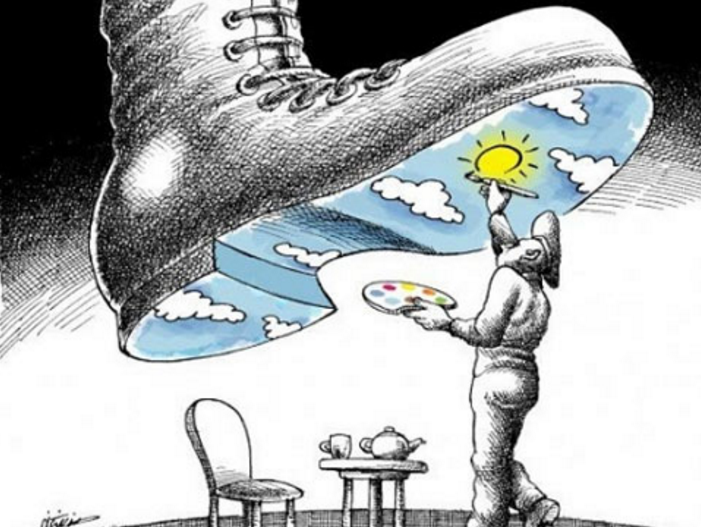
Trump’s Executive Order On Social Media Opens the Door To Bigger Government Regulation Tyranny
by Aaron Kesel, Activist Post
May 30, 2020

U.S. President Donald Trump’s executive order weaponizes Section 230 of the Communications Decency Act against social media companies, the provision that is often used to protect against being legally responsible for what users post on their networks.
There is no doubt in anyone’s mind that Twitter, Facebook, and YouTube — more appropriately named BIG social — is censoring users. However, the solution of more government regulation is a door now being opened into much harsher conditions for users under the guise of protecting free speech.
Trump signed an executive order targeting social media companies days after Twitter called two of his tweets “potentially misleading,” in a fact check.
Speaking from the Oval Office ahead of signing the historic order, Trump said the move was to “defend free speech from one of the gravest dangers it has faced in American history.”
“A small handful of social media monopolies controls a vast portion of all public and private communications in the United States,” he stated, “They’ve had unchecked power to censor, restrict, edit, shape, hide, alter, virtually any form of communication between private citizens and large public audiences.”
Handing power over to the government to police social media networks won’t fix the problem of censorship, it will enable it even more. There are also legal challenges to a proposal to use Section 230 against corporations. In essence, this is an attempt to do something similar to what the EARN IT Act being put through Congress is attempting to do, weaponizing section 230 of the Communications Decency Act.
Section 230 is a 1996 law that shields online platforms from liability for content created or shared by their users.
As Activist Post previously reported, Congress is seeking to ban companies from using end-to-end encryption and impose penalties for businesses that use it. Barr, Sen. Lindsey Graham (R-SC), and Sen. Senator Richard Blumenthal (D-CT) are targeting encryption with a new draft bill called the “Eliminating Abusive and Rampant Neglect of Interactive Technologies (or EARN IT) Act.” The act would modify the Communications Decency Act’s Section 230 to make companies liable in state criminal cases and civil lawsuits over child abuse and exploitation if they don’t follow practices set by a national commission, according to Engadget.
Although, many say Trump’s recent executive order may be unconstitutional because it risks infringing on the First Amendment rights of private companies, and because it attempts to circumvent the two other branches of government: the courts and Congress.
“Trump has no authority to rewrite a congressional statute with an executive order imposing a flawed interpretation of Section 230. Section 230 incentivizes platforms to host all sorts of content without fear of being held liable for it. It enables speech, not censorship,” Kate Ruane, senior legislative counsel at the American Civil Liberties Union said.
The Senator who was the lead legislative body behind Section 230 also chimed in.
Trump is trying to steal for himself the power of the courts and Congress to rewrite decades of settled law,” said Democratic Sen. Ron Wyden of Oregon, the architect of the legislation that the order seeks to reinterpret. “He decides what’s legal based on what’s in his interest.
Under the order, the Commerce Department would ask the Federal Communications Commission for new regulations clarifying when a company’s conduct might violate the good faith provisions of Section 230 with the goal of making it easier to sue tech companies.
Further, the order would direct the Federal Trade Commission to report on complaints about political bias collected by the White House and to consider bringing federal lawsuits against companies accused of violating the administration’s interpretation of Section 230.
However, Wired reports that Trump has little power over how social media companies operate and that the order is just for show.
Let’s get one thing out of the way: As a legal matter, that last part is nonsense. The FCC has little to no power over the meaning of Section 230, because the law itself is extremely clear. Passed in 1996, it was designed to solve a problem that plagued web forums in the early years of the internet. According to the prevailing legal doctrine at the time, a site was not liable for content posted by its users; for legal purposes, it qualified as a “distributor,” rather than a “publisher.” Imposing any type of content moderation, however, exposed a site to publisher liability. This created a powerful incentive to allow a free-for-all devoid of even the most minimal standards around things like obscenity, racism, and libel. Section 230 addressed that problem by letting websites keep their immunity and moderate user content as they see fit, “whether or not such material is constitutionally protected.”
In other words, the law gives website operators essentially free rein to decide what kind of speech is allowed on their platforms, as long as they’re not using those powers in ways that violate their own terms of service or are otherwise fraudulent. That broad mandate doesn’t leave much room for Trump or the FCC to play around.
The EFF also criticizes the order stating its a violation of the First Amendment; and if the draft order is the same final order which it appears to be, then it won’t survive the courts.
“The good news is that, assuming the final order looks like the draft we reviewed on Wednesday, it won’t survive judicial scrutiny. To see why, let’s take a deeper look at its incorrect reading of Section 230 (47 U.S.C. § 230) and how the order violates the First Amendment,” the EFF wrote.
The provisions regarding the FTC could raise additional legal questions, as the FTC is an independent agency that does not take orders from the President nor has the authority to repeal Section 230, which would have to go through Congress.
Others argue that the order isn’t crazy and it will probably work because it is about intimidation, Insider reported.
Trump does occupy the “bully pulpit,” and he does have the ability to bully the Justice Department, FCC, and Congress, perhaps enough to get them to change how they enforce the law, or even change the law itself.
Trump also has the ability to bully the social-media companies. And if Trump has demonstrated anything over the past three years, it is that he is an expert at effective bullying.
Nonetheless, Trump’s administration appears to be ready for that fight and is looking to rescind Section 230 protections.
“One of the things that I found has the broadest bipartisan support these days is the feeling that this provision, Section 230, has been stretched way beyond its original intention, and people feel that on both sides of the aisle,” DOJ head William Barr said.
Just as Barr doesn’t realize what is at stake when it comes to encryption, only seeing the dark side of things. If Section 230 were to be revoked it could harm more than just social media, putting other online businesses like Airbnb, Google, Tripadvisor and many others in the cross hairs as well, Skift reports.
Here’s a video of Trump signing the landmark executive order that will give big government more power than ever over social media. The next step is challenging this executive order in court; because if it passes, this could be the first door opened to more regulation and in turn the beginning of the death of a free and open internet.
**By [@An0nkn0wledge](https://hive.blog/@an0nkn0wledge)**
Aaron Kesel writes for Activist Post.

Truth Comes to Light highlights writers and video creators who ask the difficult questions while sharing their unique insights and visions.
Everything posted on this site is done in the spirit of conversation. Please do your own research and trust yourself when reading and giving consideration to anything that appears here or anywhere else.










